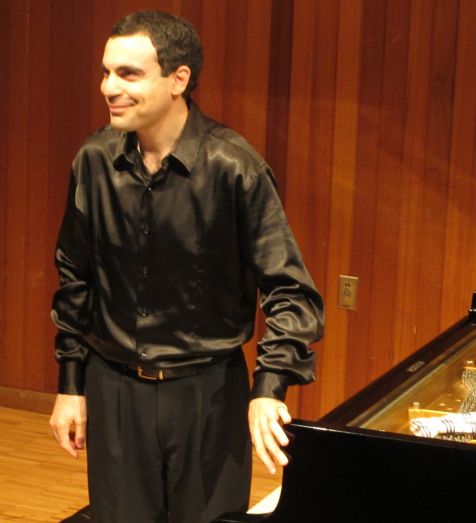|
Symphony
SRS SEASON ENDS WITH RESOUNDING TA-TA-TA-BANG
by Terry McNeill
Sunday, June 1, 2025
Symphony
YOUTHFUL VIRTUOSITY ON DISPLAY AT USO'S MAY CONCERTS
by Peter Lert
Saturday, May 17, 2025
Symphony
MYSTICAL PLANETS AND LIVELY GERSHWIN ORTIZ AT FINAL SRS CONCERT
by Peter Lert
Sunday, May 4, 2025
Symphony
VSO'S CONCERT MUSIC OF TIME, MUSIC OF PLACE
by Peter Lert
Sunday, April 27, 2025
Choral and Vocal
VOCAL ELEGANCE AND FIRE AT THE 222'S RECITAL APRIL 26
by Pamela Hicks Gailey
Saturday, April 26, 2025
CANTIAMO SONOMA SINGS AN INSPIRED GOOD FRIDAY MOZART REQUIEM CONCERT
by Pamela Hicks Gailey
Friday, April 18, 2025
DRAMATIC SHOSTAKOVICH SYMPHONY CLOSES PHILHARMONIC'S 25TH SEASON
by Terry McNeill
Sunday, April 13, 2025
LARGE COLLEGE OF MARIN AUDIENCE GREETS STOPHER ARTISTRY
by Terry McNeill
Saturday, April 5, 2025
Chamber
FRISSON DELIVERS SHIVERS OF DELIGHT
by Abby Wasserman
Sunday, March 30, 2025
OLD AND MOSTLY NEW IN SRS MARCH CONCERT IN WEILL
by Peter Lert
Saturday, March 22, 2025
|
 |
 Sandro Russo after playing |
RUSSO SCORCHES NEWMAN AUDITORIUM IN SEASON FINALE RECITAL
by Terry McNeill
Sunday, April 18, 2010
Spring thunder from sunny Italy was the order of the day April 18 when Sicilian pianist Sandro Russo closed the seventh Concerts Grand season with a dramatic recital at Santa Rosa Junior College.
In an 80-minute program before a Newman Auditorium audience of 120 Mr. Russo disdained the usual opening works of Scarlatti and Mozart and launched into a powerful rendering of Liszt’s magnificent “Variations on Weinen, Klagen, Sorgen, Sagen,” based on a Bach Cantata first heard in April, 1714. The title can be translated as “Weeping, Lamenting, Worry and Apprehension” and Mr. Russo’s imposing interpretation brought out the works majesty as well as its infinite sorrow. His running left-hand octave playing was masterly and the often judicious tempos let air into the work. There was reconciliation in the chorale where grief is overcome.
If the Liszt might could be about conquering adversity, Beethoven’s F Minor Sonata (“Appassionata”) is surely about it. With memorable past Newman performances by Joseph Banowetz and the mercurial Valentina Lisitsa, Mr. Russo had a mountain to climb in a sonata the composer was said to have liked above all others. The difficult articulation problems in the opening Allegro assai were handled with ease and Mr. Russo had the requisite speed and large tone in the second subject. The short set of variations comprising the second movement were lovingly set out, the artist in no hurry to get anywhere.
Recently pianists (e. g., Schiff, Fellner, Biss) have been playing the Sonata and especially the concluding Allegro ma non troppo is an “architectural” style, emphasizing structure and inner thematic relationships over passion. Mr. Russo would have none of this, seizing the emotional drive and sweep of the movement and bringing the audience to its feet with the final fortissimo chords. The piano would have been hot to the touch as he left the stage amid cheers.
Following intermission Lowell Liebermann’s haunting Nocturne No. 8 (2004) was given, and Mr. Russo knows these pieces (there are now 11 Nocturnes) through careful study and his own premiere of the Nocturne No. 10. The eighth is haunting, the menacing quality set against short lyrical passages. Mr. Russo’s interpretation has changed since I heard him play it in 2004, now less explosive in the big crashes of sound in measures 123 and 124, emphasizing more the mysterious nature of the writing. Is anyone writing nocturne-like works with such sonic interest as Mr. Liebermann?
The formal program concluded with Schumann’s eight-movement Kreisleriana, Op. 16. It is a difficult work to hold together, with many da capo forms of various moods. Mr. Russo approached each with care, especially in the Sehr langsam where his tonal control was exquisite. The entire performance exhibited a controlled rotation and double-note legato technique, glowing cantilena in the Sehr aufgeregt with the final conception lacking perhaps only the last portion of introspection.
The ending of the Schumann caused some confusion in the hall as the program, printed eight months ago, showed it as the last work. People were preparing to leave but fortunately Mr. Russo was in a generous mood and capped the recital and season in a driving and ultimately sensational performance of Balakirev’s Oriental Fantasy “Islamey.” Considered one of the most difficult works in the standard piano repertoire, Mr. Russo’s whirlwind of repeated notes, large right-hand skips and a dollop on bombast were equal to the score’s demands. Those in the first row were a little scorched by what one listener called a “Vesuvius” of sound, but that’s what you get with a great “Islamey” performance. There was no encore offered or needed.
Sandro Russo’s recital was on balance the most virtuosic playing heard in Santa Rosa since the Bronfman, Ohlsson and Nakamatsu concerts of three years ago and was a forceful capstone to the nine-recital Concerts Grand season.
The reviewer is the producer of the Concerts Grand series.
|

